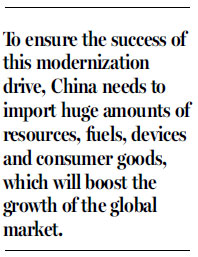
The ongoing modernization drive in China is one of the largest in human history. It will provide modern living conditions to an estimated 1.5 billion people - that is, one and half times the combined population of the developed world - by the middle of the 21st century.
To ensure the success of this modernization drive, China needs to import huge amounts of resources, fuels, devices and consumer goods, which will boost the growth of the global market. In this context, the past few years have revealed three major changes in Sino-US trade that best illustrate China's growth as the world's biggest market.
The most important change, of course, is that US exports to China have grown faster than imports from China. In 2000, the Chinese mainland was the 11th largest exporting market of the United States, but by 2007, it had overtaken Japan to become the third largest. Overall, US exports to the Chinese mainland, Hong Kong and Macao grew from $30.9 billion in 2000 to $164.8 billion in 2013, making them the fastest growing market for US exports.
US Secretary of State John Kerry has said that every $1 billion worth of exports creates more than 5,000 jobs for the US, so $164.8 billion means about 830,000 jobs - the best gift for a country whose politicians have been splitting hair over the high unemployment rate.
What's more, such growth will remain stable in the long run, because in their quest to raise their living standards Chinese people will continue to import more goods from the US. And even though the US is trying to push forward the Tran-Pacific Partnership Agreement as a club dominated by Western economies, it cannot afford to ignore China's huge market potential.
Besides, Chinese investment in the US is growing faster than US investment in China. According to New York-based advisory Rhodium Group, China's actual investment in the US from 2003 to 2013 was $25.5 billion and has continued to grow since the 2008 global financial crisis, and by 2020, China's total investment in the US is expected to exceed that of the US in China.

I’ve lived in China for quite a considerable time including my graduate school years, travelled and worked in a few cities and still choose my destination taking into consideration the density of smog or PM2.5 particulate matter in the region.